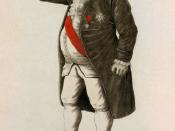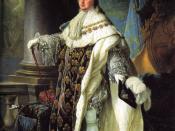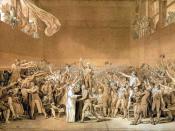This essay will be a summary of Chapter three, on the French Revolution. It will, in retrospect, describe the roller coaster years of a nation in peace and upheaval; in prosperity and poverty; in humility and humiliation. This essay also focuses on several groups and individuals who helped mould and destroy a great nation all in the name of greed and selfish desire. Absolutism, on the surface, appeared to be "THE" best system of government. However, as Arthur Young, a wealthy farming specialist from England stated, in his book "Travels in France", "...absolutism in the strictest sense was impossible in eighteenth-century France. Such a large nation could never be controlled by a single individual." King Louis XVI inherited a national system of basic inequality. This was one of the many problems of absolutism. Another was the corruption of the government which was not held accountable for hoarding revenue.
The monarchy received a small amount of the tax revenue, however, this fraction was not nearly enough for the armed forces and the quality of life at the court.
There was a definite financial crisis throughout the French Revolution and bankruptcy was not uncommon.
Social class was a great issue throughout this time. Laws, taxes, education, government jobs, military promotions, and basically life was dependant on your social status. The monarch outranked all levels of society, however, there were three estates beneath the crown. These estates were groups of people with similar social or political interests. The three estates were categorized as the Roman Catholic Clergy, Hereditary Aristocracy and the third was simply called "Everyone else".
The Roman Catholic Clergy, which were one percent of the population (or 300 delegates), did not have to pay their taxes but if they wanted to they could. However, the Hereditary Aristocracy, which made up another...


